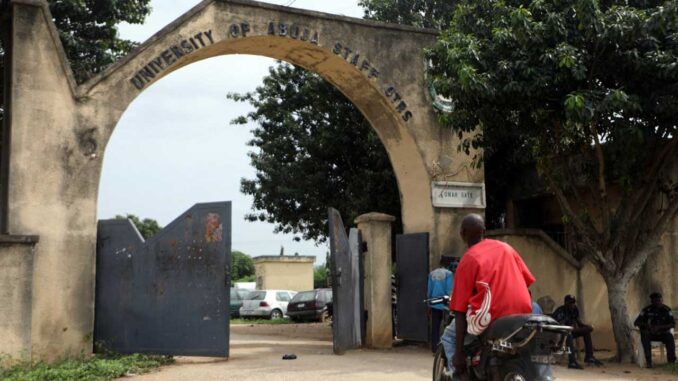
As insecurity continues to ravage the education sector — the latest assault being the attack on the University of Abuja and the kidnap of lecturers and children — the plight of teachers countrywide is grave enough to warrant special attention of the government.
The commemoration lately of World Teachers’ Day, globally acknowledged for celebrating the nobility of the teaching profession and the selflessness of teachers, was, for Nigeria, an agonising reminder of the abysmally low premium placed on the teaching profession. While the teachers have proudly guarded their simple but all-important vocation, they patiently await the fulfilment of the publicised promises made by President Muhammadu Buhari, last year.
Teachers have regularly been subjected to mockery. For a start, teaching is one of the least paying professions, one of the least attractive, and one of the most taxing in terms of man-hours spent; yet it is susceptible to convenient relegation in terms of establishment planning. Moreover, teachers have been the most humiliated professionals in the land. They have been brutalised by the economy, despised by ill-trained youths, disregarded by the society that glorifies power and possession, and blackmailed by people.
Not surprisingly, World Teachers’ Day would become a most auspicious opportunity for Nigerian politicians, especially state governors, to make flattering statements that have little or no bearing with pedagogic development. The shabby treatment of teachers was further highlighted by the fact that most governors who suffused the public space with glowing tributes for teachers are yet to implement the national minimum wage.
Owing to overpowering value disorientation that exaggerates instant gratification and personal material benefits, there is a low premium and contemptuous disposition towards certification in education and teacher training education in general. This is not the social condition, which the custodians of civilisation should be thrown into. It is unjustified and should be discouraged.
Genuine teachers are known to have the ability to shape the leaders of the future, and thereby design societies the way they should be and the path they should take. For many discerning people and societies, the nobility and age-long prestige attached to the teaching profession spells out its paramount importance as the nursery for civilisation. Though the task of imparting education primarily belongs to the family, teachers carry out this duty in loco parentis, and act in the name of the community; and so they are role models and inspirations for students.
The task of forming and passing on the traditions, mores, laws and the totality of all that constitutes civilisation, in short, the destiny of a people are reposed in the teacher. They provide guidance to all. Because of the utmost importance of the responsibilities attached to duties of teachers, teaching is rightly viewed as a vocation; one that “requires special qualities of mind and heart, most careful preparation and a constant readiness to accept new ideas and to adapt the old.” In all, the teacher’s life demands dedication, sacrifice and total self-giving in some cases.
Recognising these all-important roles of teachers to national development and global civilisation, there is a need for the Nigerian government to attract capable and excellent hands into teaching. There are many outstanding Nigerians who are naturally called to teach by virtue of their aptitude and attitude. They possess the intellectual capacity, the moral character and the emotional quotient to profess as teachers. However, many of them have been lured into other professions by economic demands, social prestige and family pressures, thereby leaving teaching to academic dregs and professional ‘gate-crashers.’
It is apt, therefore, that stakeholders recommended that welfare, training and technological development should be the main focus of attention if the government is to encourage quality teachers and put Nigeria on the path of greatness, civilised, stable and economically strong countries. Subjected to critical examination, the recommendation goes beyond the redemption of the awaited Teachers Salary Structure (TSS) (which enables the least paid teachers in the public service to earn about N150,000 monthly) and the implementation of new retirement age of 65. Indeed, the recruitment of quality teachers begins with a living wage and a welfare package that accords teachers and the teaching profession their deserved prestige. Yet, it requires quality recruitment and adequate succession management.
The United Nations Education Scientific and Cultural Organisation (UNESCO) report stated in 2013 that Nigeria needed to recruit 200, 000 qualified teachers if the country is to meet the Universal Basic Education For All goal by 2015. There is certainly a need for a declaration of education emergency in order to effect a total turnaround in the sector.
Optimum capacity-building of teachers may commence with isolating students/graduates who have the aptitude and calling for the teaching profession, even though they might have been education majors. Such an endeavour, which could take the form of an intensive programme, based on national needs assessments and in consonance with the global best practice in the teaching profession, should be carried out to prepare aspiring teachers for the task ahead. Thereafter, adequate distribution of these trained persons should be judiciously affected throughout the country.
Institutions responsible for the training of teachers should do well to ensure the needed respectability for teachers’ education. University faculties or institutes of education and Colleges of Education should not be seen as dumpsites where rejects of other courses, dullards, and never-do-wells are compelled to grudgingly acquire a certificate. A disgruntled, ill-prepared, ill-motivated teacher is a pained, traumatised professional who would always strike back at society. Such a teacher is a liability to society.
Experiences from other climes such as Finland and Norway have shown that the treatment of teachers reflects directly on how civilised and cultured a people are, and ultimately their national development.
END

Be the first to comment